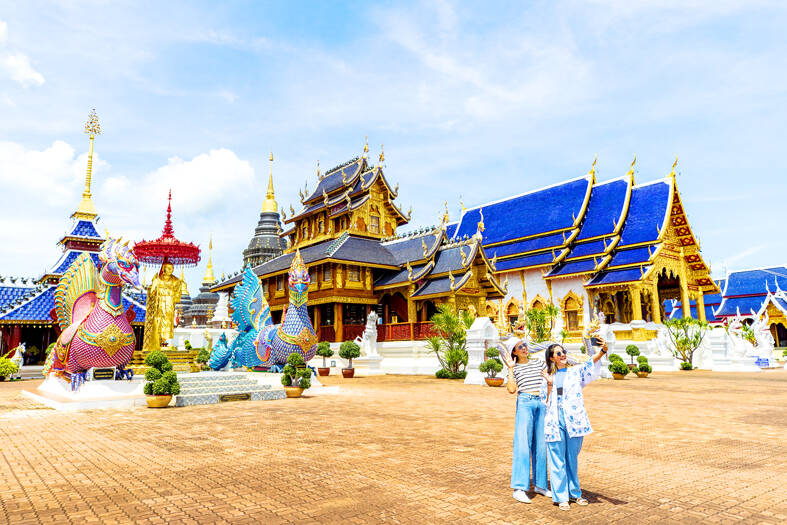The Thai government on Friday announced that Taiwanese would be allowed to stay in the country for up to 60 days per entry, under the Southeast Asian country’s visa-free program starting from today.
Taiwan is among 93 countries included in the Thai visa-waiver program, which has been expanded from 57 countries, with the visa-exempt entry extended from 30 to 60 days.
After taking office last year, Thai Prime Minister Srettha Thavisin has vowed to grant more visa waivers to foreign travelers as part of efforts to stimulate tourism.

Photo Courtesy of Tourism Authority of Thailand
The expanded visa-waiver program was on Friday signed by Thai Minister of the Interior Anutin Charnvirakul, although the government had previously said the measures would take effect last month.
Thailand first announced a visa waiver for Taiwanese travelers on Nov. 10 last year, which it continued for six months.
In early May, the Thai government announced that it would extend that visa waiver for Taiwanese tourist for an additional six months from May 11 to Nov. 11 and that the maximum stay would be 30 days.
Before joining the visa waiver program, Taiwanese were required to pay NT$1,200 per person for a Thai visa.
Thailand is one of the most popular destinations for Taiwanese tourists.
In the first four months of this year, 210,283 Taiwanese visited the country, up 74.05 percent from a year earlier, data compiled by the Tourism Administration showed.
The Ministry of Foreign Affairs said it welcomed the Thai government’s inclusion of Taiwan in the expanded visa-free program, adding that the new measure means the visa-free status granted to Taiwanese would continue without the need for an extension.
Making foreign travel more convenient for Taiwanese is one of the most important tasks for the ministry, it said, adding that the inclusion of Taiwan in the Thailand’s expanded visa-free program demonstrates its long-term efforts to improve bilateral ties.
Thailand is part of the nation’s New Southbound Policy and has become a close partner in a wide range of areas such as trade, economics, investments, education and agriculture development, the ministry said.
With the new visa-free program, Taipei and Bangkok are expected to continue to boost bilateral exchanges, it said.
The New Southbound Policy, launched in 2016 by then-president Tsai Ing-wen (蔡英文), aims to enhance trade and exchanges between Taiwan and 18 countries in Southeast and South Asia, as well as Australia and New Zealand, to reduce Taiwan’s dependence on China.
Meanwhile, Indonesia is to launch a new visa-waiver program for tourists from 20 countries, including Taiwan, Indonesian Minister of Tourism and Creative Economy Sandiaga Salahuddin Uno said last week.
The policy could be implemented in October, he said.

SECURITY: As China is ‘reshaping’ Hong Kong’s population, Taiwan must raise the eligibility threshold for applications from Hong Kongers, Chiu Chui-cheng said When Hong Kong and Macau citizens apply for residency in Taiwan, it would be under a new category that includes a “national security observation period,” Mainland Affairs Council (MAC) Minister Chiu Chui-cheng (邱垂正) said yesterday. President William Lai (賴清德) on March 13 announced 17 strategies to counter China’s aggression toward Taiwan, including incorporating national security considerations into the review process for residency applications from Hong Kong and Macau citizens. The situation in Hong Kong is constantly changing, Chiu said to media yesterday on the sidelines of the Taipei Technology Run hosted by the Taipei Neihu Technology Park Development Association. With

A US Marine Corps regiment equipped with Naval Strike Missiles (NSM) is set to participate in the upcoming Balikatan 25 exercise in the Luzon Strait, marking the system’s first-ever deployment in the Philippines. US and Philippine officials have separately confirmed that the Navy Marine Expeditionary Ship Interdiction System (NMESIS) — the mobile launch platform for the Naval Strike Missile — would take part in the joint exercise. The missiles are being deployed to “a strategic first island chain chokepoint” in the waters between Taiwan proper and the Philippines, US-based Naval News reported. “The Luzon Strait and Bashi Channel represent a critical access

CARROT AND STICK: While unrelenting in its military threats, China attracted nearly 40,000 Taiwanese to over 400 business events last year Nearly 40,000 Taiwanese last year joined industry events in China, such as conferences and trade fairs, supported by the Chinese government, a study showed yesterday, as Beijing ramps up a charm offensive toward Taipei alongside military pressure. China has long taken a carrot-and-stick approach to Taiwan, threatening it with the prospect of military action while reaching out to those it believes are amenable to Beijing’s point of view. Taiwanese security officials are wary of what they see as Beijing’s influence campaigns to sway public opinion after Taipei and Beijing gradually resumed travel links halted by the COVID-19 pandemic, but the scale of

Pope Francis is be laid to rest on Saturday after lying in state for three days in St Peter’s Basilica, where the faithful are expected to flock to pay their respects to history’s first Latin American pontiff. The cardinals met yesterday in the Vatican’s synod hall to chart the next steps before a conclave begins to choose Francis’ successor, as condolences poured in from around the world. According to current norms, the conclave must begin between May 5 and 10. The cardinals set the funeral for Saturday at 10am in St Peter’s Square, to be celebrated by the dean of the College